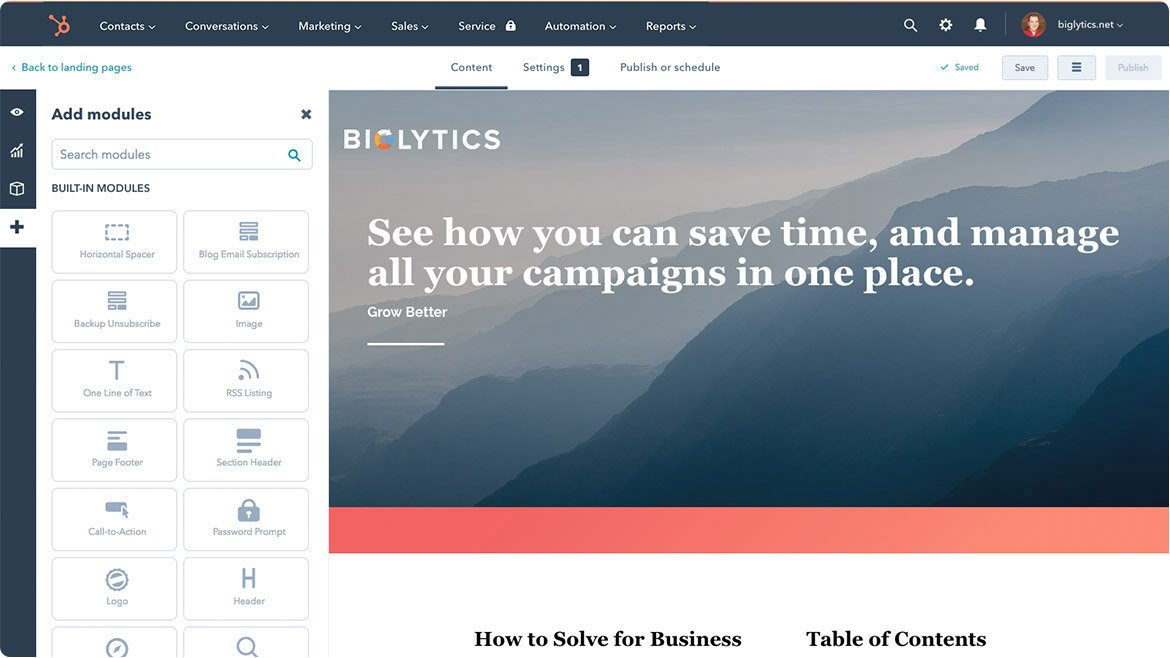If you’re thinking about switching to HubSpot CMS (content management system), there are few things you need to know and think about. In this article, we’ll show you:
- The benefits of using HubSpot CMS
- How HubSpot CMS can help with your marketing
- When you should stick with WordPress
Let’s start with the similarities. Both WordPress and HubSpot CMS are great platforms with robust functionality.

WordPress can do just about anything you want when it comes to building and managing a website. If the functionality isn’t built-in to the platform, there’s likely a plugin available that you can add on. It’s why 43.2% of all websites in 2022 are using WordPress and it’s still growing in popularity.
HubSpot can also manage your website, but where it really shines is its ability to fully integrate your marketing, sales, and service efforts. While WordPress is a great website creation and management tool, HubSpot CMS aligns your website with your total marketing efforts in a seamless manner.
Table of Contents
ToggleThe Benefits of HubSpot CMS
By seamlessly integrating HubSpot CMS with your B2B marketing, sales, support, and service efforts, you get access to a wealth of information that can help in every area.
All-in-One Solution
It’s an all-in-one solution that provides a vast assortment of tools available within the platform. This cuts down on the need to buy plugins and maintain them. Besides regular updates – and the concern that plugins can go away at any time – if there’s a problem with any of the plugins, you’ll need to work directly with individual developers to find a solution.
With WordPress, plugins are a way of life. Here are the typical plugins that B2B marketers use:
- Yoast SEO: Improve SEO
- Askimet: Blocks spam comments
- Jetpack: Social posting, design, and security
- Wordfence Security: Firewall protection
- Contact Form 7: Create simple contact forms
- Visual Composer: Website development
- Slider Revolution: Create slideshows
- WooCommerce: eCommerce modules
These are all great plugins and do the job they’re intended to do, but they also require additional maintenance. There are also plugins for the plugins. For example, Visual Composer itself has 200 third-party add-ons. WooCommerce has 331 plugins.
With HubSpot CMS, it’s all part of the toolset and it comes with support teams that are always available.
HubSpot’s CMS pricing includes everything you need for managing your site without adding in additional software. For example, you can send 2,000 emails a month for free. For WordPress, it requires additional software to do that. Here’s another example. HubSpot will scan all of the pages on your website and give you suggestions on how to improve SEO for each individual page.
If you do need additional toolsets with HubSpot CMS, you can add-on packages to scale capabilities. However, the basic bundle offers toolsets for each proficiency in the team from marketing, to sales, to customer service.
- Content Management
- Social Media
- Email marketing
- Lead CRM
- Appointment Setting
- Task Tracking
- Revenue Reporting
- Performance Reporting
HubSpot CMS Hub Allows Personalization
By tying all these things together, another big advantage of HubSpot’s CMS Hub is that you can personalize your content. This means doing things like using “smart CTAs” that personalize email outreach based on past interactions or you can configure smart content for your website pages or landing pages.
This is a slick module that lets you display different versions of content based on specific criteria. For example, you might show different website content or landing page depending on whether it’s a visitor’s first time to your site, a return visit, or if they’re a loyal customer.
This lets you customize what they see based on where they are in the customer lifecycle and display the content most relevant and most likely to convert.
Another cool tool is adaptive testing. You can continuously optimize your website by creating as many as five different variations of the same page. HubSpot monitors performance and will serve the one that’s optimal.
Better Team Collaboration and Marketing Alignment
Because content, forms, APIs, and other integrations are available for everyone on the team – and not just the website managers – it allows for faster deployment of marketing campaigns in-house. This reduces the dependency on web development teams to launch and scale marketing campaigns.
There’s a wide range of integration options available. That ensures that tools or data aren’t siloed and hidden from departments, reporting, and dashboards. This eliminates the need to pull together manual reporting to correlate data from multiple platforms to assess performance.
Marketing Automation
With the wealth of integration options, it’s easy to automate workflows with HubSpot CMS. WordPress doesn’t have these features. It would take a separate platform and manual reconciliation. This includes some of the most important aspects of your marketing efforts, including automating task such as:
- Lead scoring, prioritization, and identification of high-value leads
- Assignment of leads to specific sales departments and team members
- Responses to queries
- Lead nurturing email campaigns
It’s not just that you can do these things, it’s how you can do them as well. For example, because there’s alignment between your website folks, sales, and marketing teams, you can deliver a seamless customer experience. You can tap into your database to tailor content delivery based on psychographics, demographics, past user interactions, and customer status. If your using other HubSpot tools, such as HubSpot CRM, that data’s already available for you.
You can also segment audiences based on their stage in the customer journey and deliver relevant, personalized content designed to move them to the next stage based on almost any data point. It’s a powerful weapon and it’s built into your HubSpot eco-system.
Rapid Deployment of New Team Members
HubSpot’s team features allow you to assign access, dashboards, and functions specific to departments or “pods” in your workforce. Create a new user and onboard them into the appropriate team pod to get up and running in minutes.
While WordPress lets you enable different privileges for individual users, it does not allow for rights to be granted by teams.
Free Comprehensive Training and Certifications
HubSpot offers free training resources and world-class support. This is essential when bringing new employees on board and getting them up to speed. It’s also a great way to improve skills and keep your employees engaged.
WordPress provides basic training and there’s a robust online community of developers that are also willing to share their experience.
Advanced Lead Generation and Nurturing
If you’re designing or focusing your website for B2B lead generation, HubSpot is the clear choice.
Riverbed Marketing is a HubSpot certified agency partner and can help you integrate your inbound marketing using HubSpot tools. We’ve seen results such as a 67% increase in leads when using our blogging strategies and a 60% decrease in cost per lead using our inbound marketing strategies. Bringing your website, sales, and marketing into alignment using HubSpot can help you manage the entire digital ecosystem.

At Riverbed Marketing we can help guide you on the process to set up HubSpot effectively and train your team on how to use it. Or, we can do it for you and take the burden off your team.
When to Stick with WordPress
There are significant benefits to working with HubSpot’s entire eco-system of tools. However, there are also some times when it will make sense to work with WordPress.
If you’re primarily doing eCommerce, WordPress may be the best choice for you – especially if it’s more B2C. The WooCommerce plugin on WordPress is used by more than 28% of all online stores. It’s the most popular plugin offered.
WordPress works especially well if you’re a multi-platform seller pulling from a separate database, such as an Inventory Management System (IMS) to keep all of your inventory accurate across WordPress and other sites such as Amazon, eBay, etc. WordPress is highly configurable and supports database integration while HubSpot does not.
If you have highly technical web configurations, it may also be more practical to work with WordPress. There are plenty of developers for-hire that can handle WordPress sites. There are also some eCommerce solutions that focus more closely on retailing than HubSpot. Where HubSpot CMS shines is when your website is more focused on lead generation.
You can certainly customize your website with HubSpot CMS. Just like WordPress, there are prebuilt templates you can use. You can also customize your website yourself or have Riverbed Marketing handle it for you.
HubSpot CMS or WordPress: Which is Best for You?
The answer, like so many things in life, comes down to this: it depends. It depends on your goals and the job your website is designed to do. Techies will likely prefer WordPress. Marketers will want HubSpot. The choice is yours.
If you’re not sure which route to take, we can help. Give us a call at Riverbed Marketing. We’re a B2B marketing agency dedicated to creating measurable results. We’re happy to provide a free assessment of your situation and offer our expert advice. We’ve done this for hundreds of satisfied clients and we’ll gladly add you to the list – at no charge.












